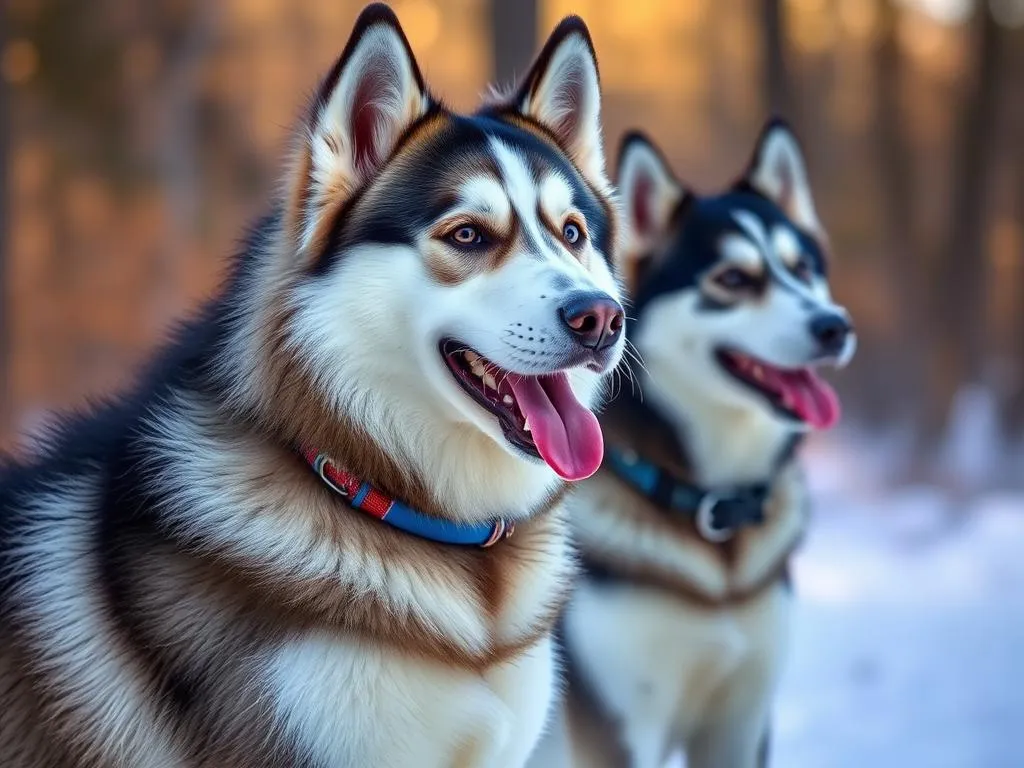
Introduction
Proper nutrition is crucial for every dog, but it takes on heightened importance for active breeds like Huskies. Known for their high energy levels and striking appearance, Huskies have unique dietary needs that vary based on their activity levels, age, and overall health. Ensuring they receive the right nutrients not only supports their energy requirements but also promotes healthy skin, a shiny coat, and optimal growth. In this article, we’ll delve into the best dog foods for Huskies and provide tips to help you choose the ideal diet for your furry companion.
Understanding the Nutritional Needs of Huskies
Caloric Requirements
Huskies are known for their athleticism and stamina, requiring a specific caloric intake to maintain their energy levels. Generally, a Husky will need between 1,200 and 1,600 calories per day, depending on their age, weight, and activity level.
- Active Huskies: If your Husky is highly active, engaging in regular exercise or work, they may need more calories.
- Sedentary Huskies: Older or less active Huskies will require fewer calories to prevent obesity.
Understanding your Husky’s individual needs is essential to maintaining a healthy weight and preventing health issues associated with overfeeding.
Essential Nutrients
To thrive, Huskies require a balanced diet rich in essential nutrients:
-
Proteins: Vital for muscle health and energy, proteins should make up a significant portion of your Husky’s diet. Look for high-quality sources like real meat or fish.
-
Fats: Healthy fats play a crucial role in maintaining skin and coat health. Omega-3 and Omega-6 fatty acids are particularly beneficial for Huskies.
-
Carbohydrates: While not a primary energy source, complex carbohydrates can aid digestion and provide sustained energy. Whole grains and vegetables are excellent choices.
-
Vitamins and Minerals: Essential for overall health, vitamins and minerals support various bodily functions. Look for a dog food that includes a blend of these nutrients.
Common Health Issues in Huskies
Huskies can face several health issues that are often linked to diet, such as obesity and skin problems. Tailoring their nutrition can help mitigate these issues. For example, maintaining a balanced diet rich in Omega fatty acids can reduce skin irritations, while a focus on high-quality protein can prevent obesity by keeping your Husky feeling full and satisfied.
Types of Dog Food for Huskies
Dry Kibble
Dry kibble is one of the most popular choices for dog food, and for a good reason.
Benefits:
– Convenient and easy to store.
– Helps maintain dental health by reducing plaque buildup.
Drawbacks:
– Some lower-quality kibble can contain fillers and artificial additives.
Recommended Brands:
– Orijen: Known for its high protein content and quality ingredients.
– Taste of the Wild: Offers grain-free options with real meats and wholesome ingredients.
Wet Food
Wet food can be appealing to many dogs due to its taste and aroma.
Benefits:
– Typically higher in protein and moisture content.
– Easier to chew, making it suitable for older dogs or those with dental issues.
Drawbacks:
– Can be more expensive and requires refrigeration after opening.
Recommended Brands:
– Hill’s Science Diet: Focuses on veterinary formulas tailored for specific health needs.
– Purina Pro Plan: Offers a variety of flavors while maintaining quality ingredients.
Raw Diet
A raw diet, often referred to as a “BARF” (Biologically Appropriate Raw Food) diet, advocates feeding dogs raw meats, bones, fruits, and vegetables.
Pros:
– Provides a natural diet that many believe is healthier.
– Can enhance coat quality and overall vitality.
Cons:
– Requires careful planning to ensure a balanced diet.
– Risks of bacterial contamination if not handled properly.
Important Considerations:
– Consult with a veterinarian before starting a raw diet.
– Ensure proper food handling and storage practices are followed.
Homemade Dog Food
Preparing homemade meals for your Husky can be rewarding but requires careful attention to nutritional balance.
Pros:
– Complete control over ingredients.
– Can cater to specific dietary sensitivities or preferences.
Cons:
– Requires time and knowledge to ensure a balanced diet.
– Can be challenging to maintain consistency in nutrient levels.
Sample Recipes:
– Chicken and Rice: Cooked chicken breast, brown rice, and carrots.
– Beef and Sweet Potato: Ground beef, sweet potatoes, and peas.
Top Recommended Dog Foods for Huskies
Factors to Consider When Choosing Dog Food
When selecting the best dog foods for Huskies, consider the following:
- Ingredients: Look for high-quality proteins as the first ingredient and avoid fillers like corn and soy.
- Nutritional Balance: Ensure the food contains a good balance of proteins, fats, and carbohydrates.
- Avoid Artificial Additives: Steer clear of foods with artificial colors, flavors, and preservatives.
Reviews of the Best Dog Foods for Huskies
- Brand 1: Orijen
- Overview: High-protein, grain-free kibble made with fresh, regional ingredients.
- Ingredients: Chicken, turkey, fish, fruits, and vegetables.
- Pros: High-quality protein, rich in nutrients.
-
Cons: Higher price point.
-
Brand 2: Blue Buffalo Wilderness
- Overview: Grain-free formula designed for active dogs.
- Ingredients: Deboned chicken, fish meal, sweet potatoes, peas.
- Pros: Rich in protein and includes antioxidants.
-
Cons: Some dogs may be sensitive to high protein levels.
-
Brand 3: Taste of the Wild High Prairie Canine Recipe
- Overview: Features roasted bison and roasted roasted venison for protein.
- Ingredients: Bison, roasted venison, peas, sweet potatoes.
- Pros: Grain-free, rich in omega fatty acids.
-
Cons: May not be suitable for dogs with certain allergies.
-
Brand 4: Wellness CORE Grain-Free
- Overview: High-protein, grain-free food designed for weight management.
- Ingredients: Turkey, chicken, potatoes, and flaxseed.
- Pros: Good for maintaining a healthy weight.
-
Cons: Some dogs may prefer a different flavor profile.
-
Brand 5: Hill’s Science Diet Adult Large Breed
- Overview: Specifically formulated for large breeds, including Huskies.
- Ingredients: Chicken meal, whole grain corn, and barley.
- Pros: Tailored for large breeds, contains natural ingredients.
- Cons: Contains grains, which some owners prefer to avoid.
Feeding Guidelines for Huskies
Portion Control
Determining the right portion size for your Husky is essential for maintaining a healthy weight. Refer to the feeding guidelines on the dog food packaging, adjusting based on your dog’s weight, age, and activity level. A general rule is to feed a Husky 2-3% of their body weight in food daily, split into two meals.
Feeding Schedule
Establishing a consistent feeding schedule is beneficial. Puppies require more frequent meals (3-4 times a day), while adult Huskies typically thrive on two meals per day. This routine helps maintain energy levels and promotes digestion.
Transitioning Foods
When changing your Husky’s diet, it’s crucial to transition gradually to avoid digestive issues. Start by mixing a small amount of the new food with their current food, gradually increasing the new food ratio over 7-10 days.
Additional Tips for Huskie Nutrition
Hydration
Hydration is vital for your Husky’s health. Ensure there’s always fresh, clean water available, especially after exercise. Huskies are prone to dehydration, so keep an eye on their water intake, particularly in warmer weather.
Treats and Snacks
Healthy treats can be a great addition to your Husky’s diet, but moderation is key. Look for treats made from natural ingredients, such as freeze-dried meats or vegetables. Avoid giving too many treats to prevent weight gain; they should account for no more than 10% of your dog’s daily caloric intake.
Monitoring Health and Weight
Regular vet check-ups are essential for monitoring your Husky’s health and weight. Watch for signs of dietary issues, such as sudden weight gain or loss, changes in coat quality, or digestive problems. Early detection of issues can prevent more significant health problems down the line.
Frequently Asked Questions (FAQs)
Can Huskies eat grains?
Yes, Huskies can eat grains, but some may be sensitive to them. Whole grains like brown rice and oats can be beneficial, but always monitor your dog for any adverse reactions.
What are the best proteins for Huskies?
High-quality animal proteins such as chicken, beef, fish, and lamb are excellent choices for Huskies. These sources provide essential amino acids required for muscle health and energy.
How much should I feed my Husky?
Feeding amounts depend on your Husky’s weight, age, and activity level. Generally, an active adult Husky will require about 2-3% of their body weight in food daily.
Are there specific foods that Huskies should avoid?
Huskies should avoid foods high in fillers, artificial additives, and certain human foods like chocolate, onions, garlic, and grapes, which are toxic to dogs.
Conclusion
Choosing the right diet for your Husky is vital for their overall health, energy levels, and vitality. With their unique nutritional needs, it’s essential to consider factors like caloric intake, essential nutrients, and any specific health issues your dog may have. Always consult with your veterinarian for personalized advice and recommendations tailored to your furry friend. By investing the time to find the best dog foods for Huskies, you’re ensuring a healthy and happy life for your beloved pet.









